Shaykh Saalih al-Fawzaan's Checking of the Book
The author, Isaam bin Abdullaah as-Sinaanee, mentions on page 27 (2nd edition):
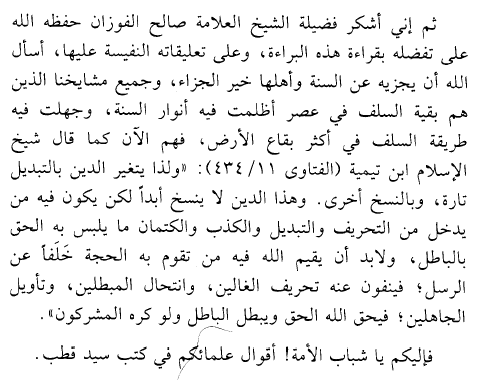
 Then I (also) thank the esteemed Shaykh, the Allaamah, Saalih al-Fawzaan (hafidhahullaah) for undertaking the reading of this "Baraa'ah", and for his precious [written] comments upon it... [to the end] ...
Then I (also) thank the esteemed Shaykh, the Allaamah, Saalih al-Fawzaan (hafidhahullaah) for undertaking the reading of this "Baraa'ah", and for his precious [written] comments upon it... [to the end] ...
And here is the copy of the letter sent by the author to the Shaykh and the Shaykh's response, on the letter itself:
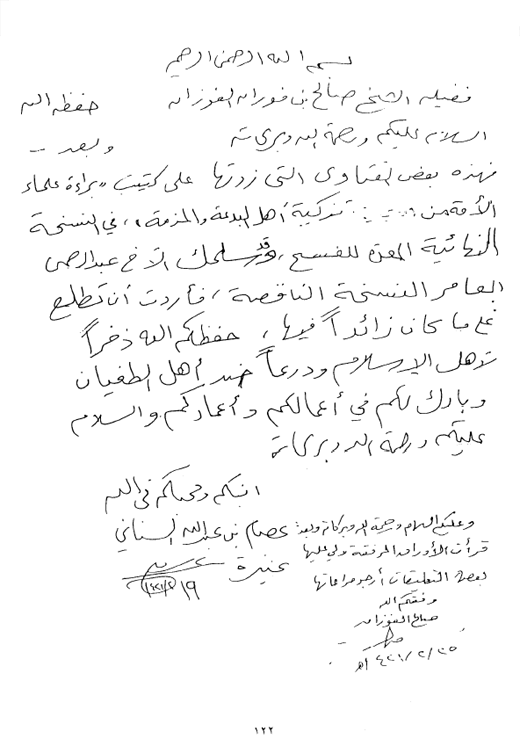
And the author wrote to Shaykh Saalih al-Fawzaan saying:
Then I (also) thank the esteemed Shaykh, the Allaamah, Saalih al-Fawzaan (hafidhahullaah) for undertaking the reading of this "Baraa'ah", and for his precious [written] comments upon it... [to the end] ...
 ...these are some fataawaa that I added upon the treatise "Baraa'ah Ulamaa il-Ummah min Tazkiyah Ahl il-Bid'ah wal-Mudhammah" in handwritten script... and the brother Abdur-Rahmaan al-Aamir had submitted a deficient manuscript to you, so I wanted to show to you what has been [made] as an addition to it, may Allaah preserve you as a treasure for the people of Islaam and as a armour against the people of transgression, and may Allaah bless your actions and your life, and as-salaamu alaykum warahmatullaahi wabarakaatuh.
...these are some fataawaa that I added upon the treatise "Baraa'ah Ulamaa il-Ummah min Tazkiyah Ahl il-Bid'ah wal-Mudhammah" in handwritten script... and the brother Abdur-Rahmaan al-Aamir had submitted a deficient manuscript to you, so I wanted to show to you what has been [made] as an addition to it, may Allaah preserve you as a treasure for the people of Islaam and as a armour against the people of transgression, and may Allaah bless your actions and your life, and as-salaamu alaykum warahmatullaahi wabarakaatuh.
Then the Shaykh sent the manuscript back with a written note on the same letter:
 Wa alaykum us-salaam warahmatullaahi wabarakaatuh, to proceed: I rad the enclosed papers, and I have some [written] comments upon them, I hope you observe them, may Allah grant you success. Saalih al-Fawzaan [signature], 25/2/1421H.
Wa alaykum us-salaam warahmatullaahi wabarakaatuh, to proceed: I rad the enclosed papers, and I have some [written] comments upon them, I hope you observe them, may Allah grant you success. Saalih al-Fawzaan [signature], 25/2/1421H.
This was to corroborate that the Shaykh checked the book. Now moving on to the subject, it is similar to what was said regarding Shaykh al-Uthaymeen (rahimahullaah) - see here - and the same can be said about Shaykh Saalih al-Fawzaan.
Shaykh Saalih al-Fawzaan Affirms That there is a Qutbi Manhaj, That it is Deviant and that It is Other than the Salafi Manhaj and that They Can Never Meet and that The Distance Between them is Like that Between the East and West
The author included a section regarding the difference between the Salafi Manhaj and the Qutbi Manhaj, and these are the relevant pages from the book(pp. 110-113, 2nd edition)
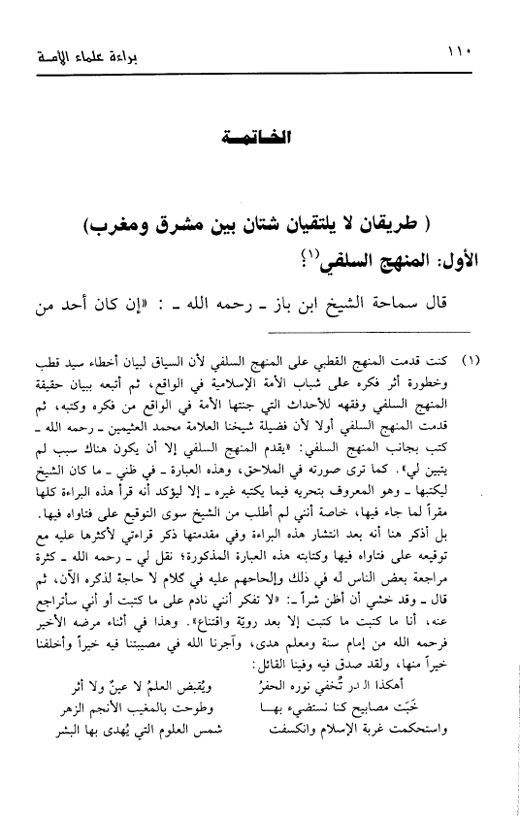
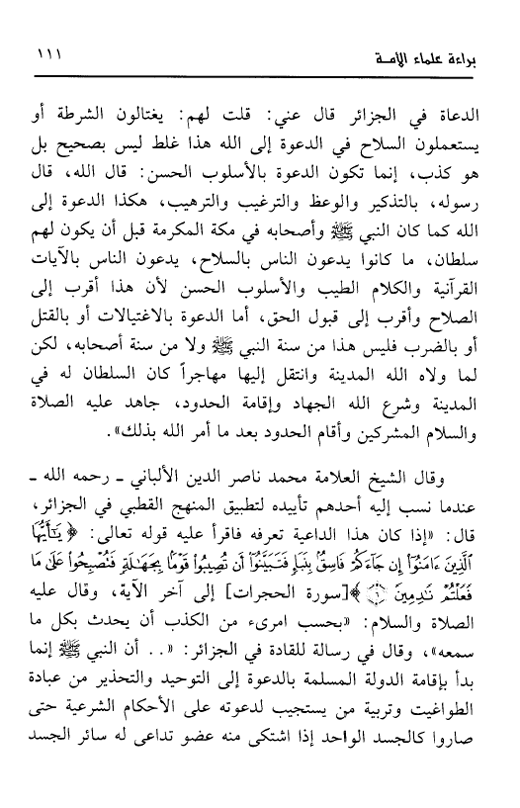
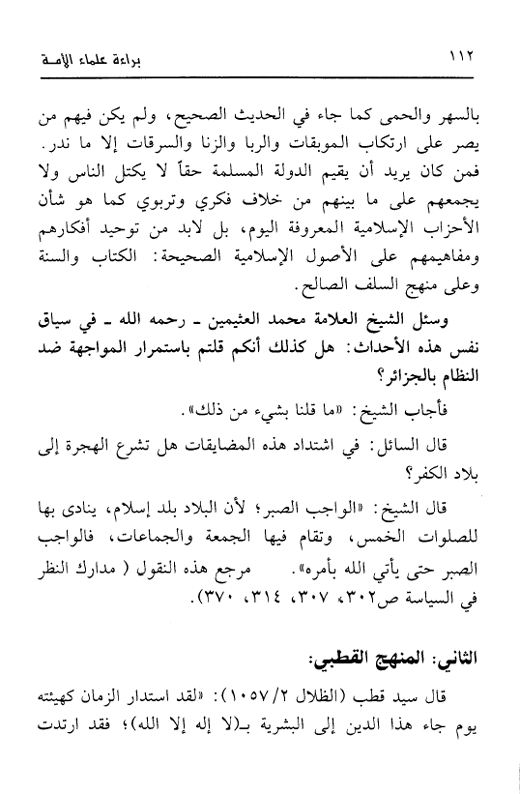
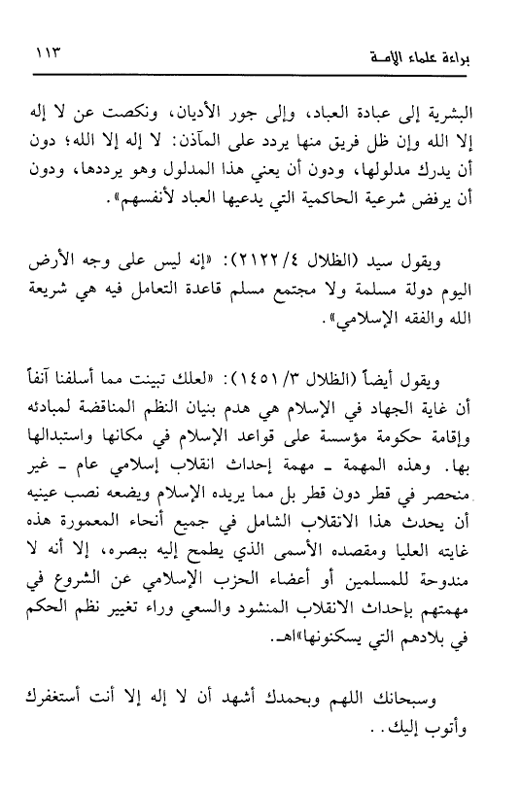
And in the first edition they appear on pages 115-119. Inshaa'Allaah these can be translated as a separate article, but from the above, the following should be noted:
- Shaykh al-Fawzaan read the book and agreed with it, showed acceptance of it, checked it and checked over his own fatwas in the book, and made suggested changes.
- Shaykh al-Fawzaan corroborates the existence of a "Qutbi Manhaj", that it is a world apart form the "Salafi Manhaj", in the sense that between them both is the distance between the East and the West, and this is because the author, Isaam bin Abdullaah as-Sinaanee, introduced the section with the title, "Two Ways That do Not Meet, How Different They Are, Between the East and the West", and then he titled "The Qutbi Manhaj" and then "The Salafi Manhaj", so Shaykh Ibn Uthaymeen corroborated all of that.
- What he included under the section "The Salafi Manhaj" were clarifications from each of Imaam Ibn Baaz, Imaam al-Albaani and Imaam Ibn Uthaymeen, all of them clearing the lies against them regarding alleged advices they were supposed to have given to the people of Algeria in the fitnah there in the 90s, and they clarified that their advice was and is that they call to Allaah beginning with Tawheed, and not to fight against the authorities, and that to establish Islaam, they have to establish it in the people first, in reality. And those people who made these false allegations about them were the Qutbiyyah of Saudi Arabia - and that is the subject of another article.
- What the author included under the section "The Qutbi Manhaj" is the Takfir of Sayyid Qutb of all Muslim societies, and his claim of the obligation of a worldwide revolution in toppling all authorities as a form of jihaad and to replace them with an Islamic government, and his call for every one in every country to this goal. Learn more about that manhaj here.
- And it is clear from all of this that Shaykh al-Fawzaan corroborates the existence of "the Qutbiyyah" and "the Qutbi Manhaj" and this is not from the invention of the so called "Madkhalis". As we said, the hatred of these people is for all of the Scholars, its not about Shaykh Rabee' al-Madkhali, but the word "Madkhali" they use as a derogatory term is simply a veil through which they desire to attack the manhaj that all the Salafi Shaykhs were and are upon. That's what their real problem is.
It is apparent from all of the above that Shaykh al-Fawzaan would have to be considered - upon the language and understanding of the Takfiris and Qutbis - a "Madkhali" scholar, except that these people are too cowardly to express their denigration of the Shaykh in this manner, because then all people would know of their misguidance and fraud in claiming to be upon the Salafi aqidah and Salafi Manhaj. Their attempt at using the label "Madkhali" to deceive the people and to protect the grave-frequenting soofees, and Ash'aris who brought them their methodologies has come to its end walhamdulillaah, and it is clear that their outward attachment to the Salafi aqidah is only a means by which the aqidah of Sayyid Qutb (see here), and the methodologies of Qutb and Banna can be introduced to people in order to effect Leninist-type revolutions in the Muslim lands. In fact on their forums and blogs they explicitly state this, they don't even hide the fact that the ideologies and methodologies of secular atheist Jews are their chosen preferred method above and over the methodologies of the Prophets, and the sayings of Imaam Malik (rahimahullaah), "The latter part of this Ummah will not be rectified except by that which rectified its earlier part". But alhamdulillaah, the Scholars of Ahl us-Sunnah, by the end of the 1990s and the early 21st century, exposed these people and their wishes and desires crumbled, turning into gaseous matter. This is why these people have so much hatred, enmity and resentment, you can read it and see it in their actions. But to avoid people recognizing their corruption, they scapegoat just one Scholar, whereas in reality, their hate, anger and resentment is towards all the Scholars.

